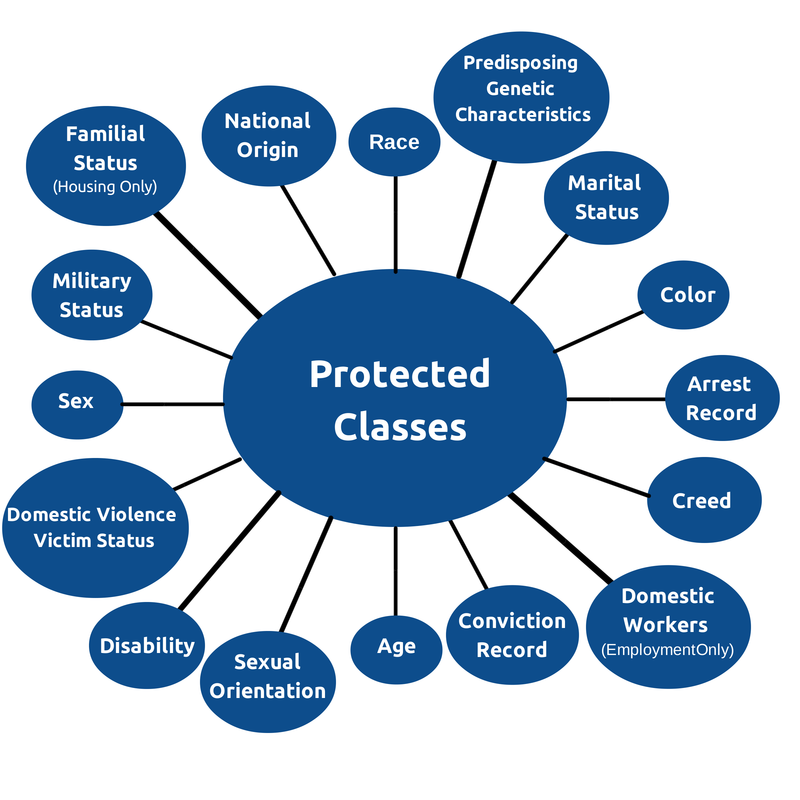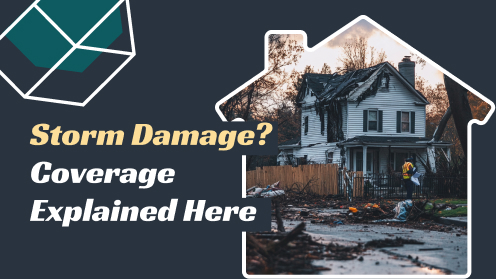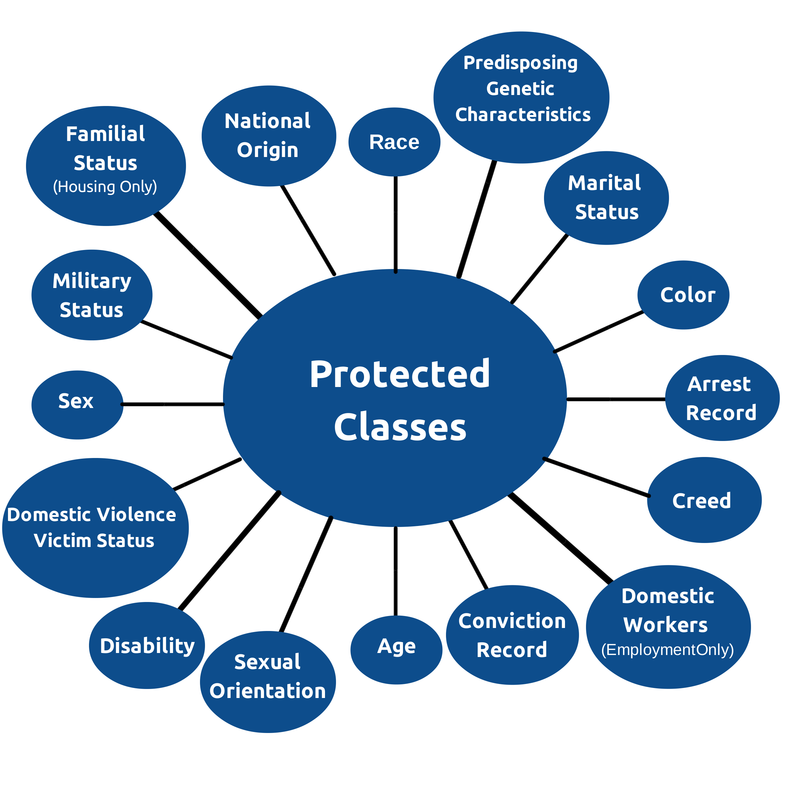Things you should not have your clients put in a letter to a buyer or seller.
Protected Class
-
Race.
-
Color.
-
Religion or creed.
-
National origin or ancestry.
-
Sex.
-
Age.
-
Physical or mental disability.
-
Veteran status.
-
Genetic information.
-
Citizenship.More…
Discrimination is treating people differently. Discrimination is unlawful when it is based on a personal trait or characteristic protected under Human Rights Law. The traits that are protected under Human Rights Law are called Protected Classes. It is unlawful to discriminate against a member of a protected class when it comes to housing, employment, public accommodation, credit and lending, certain educational institutions, and volunteer firefighting organizations.
Rights
All citizens should be aware of their rights under Human Rights Law, including their right to file complaints against alleged acts of discrimination. In order for an alleged discriminatory act to be illegal, there must be a connection between what happened to you and the trait/characteristic protected by the Human Rights Law. Making a Human Rights complaint is free for the person making the complaint.Responsibilities
If you are an employer, housing professional, lending institution, or business, it is important to understand your responsibilities under the Human Rights Law. Awareness of the laws can help you create equitable environments in our community, as well as prevent costly and time-consuming legal proceedings.
Descriptions of Protected Classes
Age
The Human Rights Law protects person(s) age 18 or older. A person cannot be discriminated against on the basis of his or her age in the area of employment or housing. Age discrimination usually occurs in employment when older workers are fired, replaced by younger workers, or treated differently than younger colleagues. Employees cannot be forced to retire except for very limited situations relative to tenured professors and certain highly paid executives.
Creed
Relates to a person’s religious beliefs. The wearing of religious garb and the observance of religious holidays and practices are protected under the Human Rights Law.
Race & Color
Race and color pertains to a person’s racial background and/or skin color.
Sex
Discrimination on the basis of sex includes unequal treatment in the workplace, sexual harassment, and pregnancy discrimination. Under the Human Rights Law, men and women are entitled to equal pay, benefits, working conditions, and seniority rights; men and women are entitled to be free from unwelcome sexual advances, requests for sexual favors, physical or verbal conduct of a sexual nature, and a hostile work environment; and pregnant women are guaranteed the right to work, and to enjoy the same medical, vacation and disability leave policies as non-pregnant co-workers. Although sex discrimination occurs most frequently in the workplace, it also occurs in areas concerning housing, credit, and public accommodations.
Sexual Orientation
The Sexual Orientation Non-Discrimination Act of January 16, 2003, amends the New York State Human Rights Law to prohibit actual or perceived sexual orientation discrimination in places of public accommodation, non-sectarian educational institutions, credit transactions, housing, commercial property, and in obtaining employment. Sexual Orientation is defined as gay, lesbian, bisexual, heterosexual, and asexual.
National Origin
Is based on one’s national group and includes one’s ancestry.
Marital Status
A person may not be discriminated against on the basis of whether or not he or she is married, divorced, single, separated or widowed.
Domestic Violence Victim Status
The New York State Human Rights Law was amended effective July 7, 2009 to provide protection from employment discrimination for victims of domestic violence. The Human Rights Law defines a domestic violence victim as an individual who is a victim of an act, which would constitute a family offense under N.Y. Family Court Act § 812. It is unlawful to discriminate against a domestic violence victim in employment and housing.
Disability
A disability is a physical, mental, or medical impairment resulting from anatomical, physiological, or neurological conditions that prevent the exercise of a normal bodily function or is demonstrable by clinical or laboratory diagnostics techniques. If a person has a record of a disability or is perceived by others to have a disability, whether or not the person does, he or she is also protected under the Human Rights Law. Under the jurisdiction of employment, a person is protected when the disability does not interfere with the ability to reasonably perform job duties. It is illegal to discriminate against people who have, are perceived to have, perceived to be at risk for HIV/AIDS.
Military Status
Discrimination on the basis of military status involves denying equal employment opportunity to any person because of that person’s past, current or future membership, service or obligation in a uniformed service.
Arrest & Conviction
It is unlawful for any person, agency, bureau, corporation or association, including the State and any political subdivision thereof, to deny employment because of an individual’s conviction record, where such denial is in violation of Article 23-a of the Correction Law. A potential employer cannot make any inquiry about an arrest record, but can inquire if a potential employee has been convicted of a crime.
Predisposing Genetic Characteristics
Employment discrimination on the basis of genetic predisposition or carrier status is prohibited by the Human Rights Law. The legislature added this protection to the law in 1996.
Familial Status (in housing only)
Discrimination in the rental, purchase, or lease of housing on the basis of familial status is prohibited. Familial status means any person who is pregnant, has a child, or is in the process of securing legal custody of any individual under the age of 18; or one or more individuals under the age of 18 living with a parent, a legal guardian, or a designee of a parent.
Domestic Workers (in employment only)
It is unlawful for an employer to engage in unwelcome sexual advances, requests for sexual favors, or other verbal or physical conduct of a sexual nature to a domestic worker when: (i) submission to such conduct is made either explicitly or implicitly a term or condition of an individual’s employment; (ii) submission to or rejection of such conduct by an individual is used as the basis for employment decisions affecting such individual; or (iii) such conduct has the purpose or effect of unreasonably interfering with an individual’s work performance by creating an intimidating, hostile, or offensive working environment.
Utah House Committee Votes Against Bills That Make Housing More Affordable
A Utah House committee did not vote on two housing bills, HB 88 and HB 90, aimed at addressing the state's housing shortage, despite support from the governor's office. HB 88 would allow detached accessory dwelling units in urban residential zones, while HB...

Ready to Buy a Home in 2025? Get the Inside Scoop
Start preparing finances early: Ensure credit is good, calculate affordability, and get ready to make a competitive offer.Current market improvements: 2025 offers better opportunities for buyers after high prices and limited options in 2024.

Cut Your Insurance Premiums: Simple Savings Tips
Maintain a Good Credit Rating: Strong credit scores often lead to lower premiums for auto and homeowner insurance.Drive Safely: A clean driving record and good grades for students can significantly reduce insurance costs.
Utah lawmakers say no to ‘preemption,’ halt 2 housing bills aimed at allowing smaller homes
Utah lawmakers are facing challenges in addressing the housing affordability crisis, with two bills aimed at allowing smaller homes failing to progress in the legislative session. Rep. Ray Ward's proposals, which included permitting accessory dwelling units and...

Tips for Finding Bargain Houses in 2025
Start house hunting in January to benefit from lower prices and reduced buyer competition. Hire a local Real Estate agent with expertise in undervalued properties and market trends.
A Utah bill requiring 60 days notice to raise rent fails
A Utah bill requiring landlords to provide two months' notice before raising rent has been halted for the third consecutive year. The House Business, Labor, and Commerce Committee rejected HB182, which aimed to give tenants more security. The Utah Rental Housing...
Surprising Trend Pops Up in This State To Help Buyers Nab Their First Homes
A new housing trend in Utah is emerging, offering affordable options amid skyrocketing home prices, with the median list price in Salt Lake City at $550,000. Local employers are struggling to find workers due to high property costs. Homebuilder BoxHouse in St. George...

Get Your House Market-Ready
Consult a REALTOR®: A local agent helps price your home correctly and attract potential buyers. Complete Repairs: Fix any outstanding issues, like leaky faucets or worn-out flooring, for a polished look.

Conditions That Make or Break Your Home Contract
Specify mortgage details, interest rates, and loan types to avoid issues with earnest money deposits. Want seller assistance with closing costs? You must ask for it in your offer!

Does Home Insurance Shield Hurricane Damage?
Dwelling and personal property coverage repair your home and replace belongings, subject to policy limits and deductibles. Hurricane deductibles differ: Typically 1–5% of dwelling coverage, significantly impacting your out-of-pocket costs.

